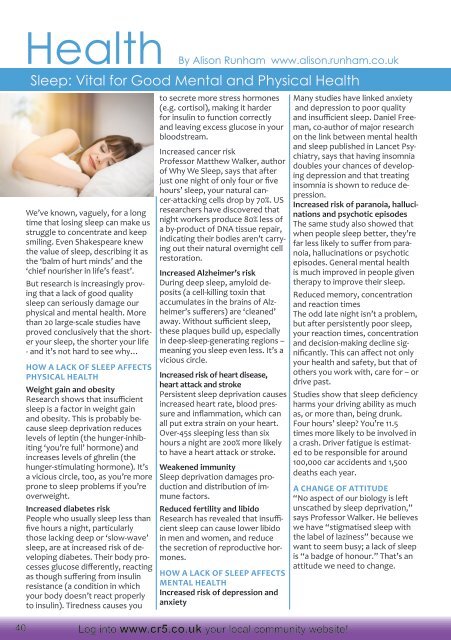CR5 Issue 152 Jan 2018
A local community magazine containing business advertising, interesting reads, What's On in the area and puzzles
A local community magazine containing business advertising, interesting reads, What's On in the area and puzzles
Create successful ePaper yourself
Turn your PDF publications into a flip-book with our unique Google optimized e-Paper software.
Health By Alison Runham www.alison.runham.co.uk<br />
Sleep: Vital for Good Mental and Physical Health<br />
We’ve known, vaguely, for a long<br />
time that losing sleep can make us<br />
struggle to concentrate and keep<br />
smiling. Even Shakespeare knew<br />
the value of sleep, describing it as<br />
the ‘balm of hurt minds’ and the<br />
‘chief nourisher in life’s feast’.<br />
But research is increasingly proving<br />
that a lack of good quality<br />
sleep can seriously damage our<br />
physical and mental health. More<br />
than 20 large-scale studies have<br />
proved conclusively that the shorter<br />
your sleep, the shorter your life<br />
- and it’s not hard to see why…<br />
HOW A LACK OF SLEEP AFFECTS<br />
PHYSICAL HEALTH<br />
Weight gain and obesity<br />
Research shows that insufficient<br />
sleep is a factor in weight gain<br />
and obesity. This is probably because<br />
sleep deprivation reduces<br />
levels of leptin (the hunger-inhibiting<br />
‘you’re full’ hormone) and<br />
increases levels of ghrelin (the<br />
hunger-stimulating hormone). It’s<br />
a vicious circle, too, as you’re more<br />
prone to sleep problems if you’re<br />
overweight.<br />
Increased diabetes risk<br />
People who usually sleep less than<br />
five hours a night, particularly<br />
those lacking deep or ‘slow-wave’<br />
sleep, are at increased risk of developing<br />
diabetes. Their body processes<br />
glucose differently, reacting<br />
as though suffering from insulin<br />
resistance (a condition in which<br />
your body doesn’t react properly<br />
to insulin). Tiredness causes you<br />
to secrete more stress hormones<br />
(e.g. cortisol), making it harder<br />
for insulin to function correctly<br />
and leaving excess glucose in your<br />
bloodstream.<br />
Increased cancer risk<br />
Professor Matthew Walker, author<br />
of Why We Sleep, says that after<br />
just one night of only four or five<br />
hours’ sleep, your natural cancer-attacking<br />
cells drop by 70%. US<br />
researchers have discovered that<br />
night workers produce 80% less of<br />
a by-product of DNA tissue repair,<br />
indicating their bodies aren’t carrying<br />
out their natural overnight cell<br />
restoration.<br />
Increased Alzheimer’s risk<br />
During deep sleep, amyloid deposits<br />
(a cell-killing toxin that<br />
accumulates in the brains of Alzheimer’s<br />
sufferers) are ‘cleaned’<br />
away. Without sufficient sleep,<br />
these plaques build up, especially<br />
in deep-sleep-generating regions –<br />
meaning you sleep even less. It’s a<br />
vicious circle.<br />
Increased risk of heart disease,<br />
heart attack and stroke<br />
Persistent sleep deprivation causes<br />
increased heart rate, blood pressure<br />
and inflammation, which can<br />
all put extra strain on your heart.<br />
Over-45s sleeping less than six<br />
hours a night are 200% more likely<br />
to have a heart attack or stroke.<br />
Weakened immunity<br />
Sleep deprivation damages production<br />
and distribution of immune<br />
factors.<br />
Reduced fertility and libido<br />
Research has revealed that insufficient<br />
sleep can cause lower libido<br />
in men and women, and reduce<br />
the secretion of reproductive hormones.<br />
HOW A LACK OF SLEEP AFFECTS<br />
MENTAL HEALTH<br />
Increased risk of depression and<br />
anxiety<br />
40 Log into www.cr5.co.uk your local community website!<br />
Many studies have linked anxiety<br />
and depression to poor quality<br />
and insufficient sleep. Daniel Freeman,<br />
co-author of major research<br />
on the link between mental health<br />
and sleep published in Lancet Psychiatry,<br />
says that having insomnia<br />
doubles your chances of developing<br />
depression and that treating<br />
insomnia is shown to reduce depression.<br />
Increased risk of paranoia, hallucinations<br />
and psychotic episodes<br />
The same study also showed that<br />
when people sleep better, they’re<br />
far less likely to suffer from paranoia,<br />
hallucinations or psychotic<br />
episodes. General mental health<br />
is much improved in people given<br />
therapy to improve their sleep.<br />
Reduced memory, concentration<br />
and reaction times<br />
The odd late night isn’t a problem,<br />
but after persistently poor sleep,<br />
your reaction times, concentration<br />
and decision-making decline significantly.<br />
This can affect not only<br />
your health and safety, but that of<br />
others you work with, care for – or<br />
drive past.<br />
Studies show that sleep deficiency<br />
harms your driving ability as much<br />
as, or more than, being drunk.<br />
Four hours’ sleep? You’re 11.5<br />
times more likely to be involved in<br />
a crash. Driver fatigue is estimated<br />
to be responsible for around<br />
100,000 car accidents and 1,500<br />
deaths each year.<br />
A CHANGE OF ATTITUDE<br />
“No aspect of our biology is left<br />
unscathed by sleep deprivation,”<br />
says Professor Walker. He believes<br />
we have “stigmatised sleep with<br />
the label of laziness” because we<br />
want to seem busy; a lack of sleep<br />
is “a badge of honour.” That’s an<br />
attitude we need to change.

















